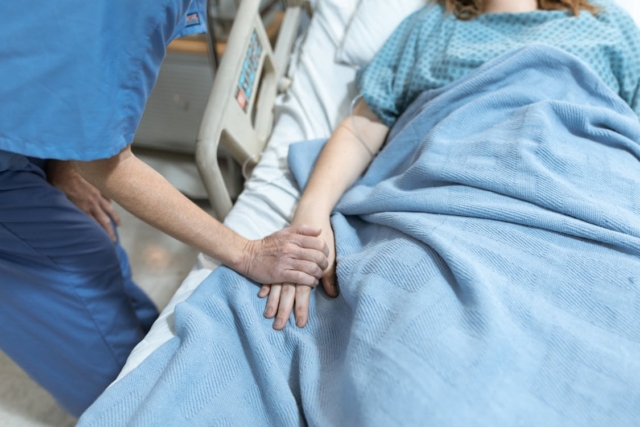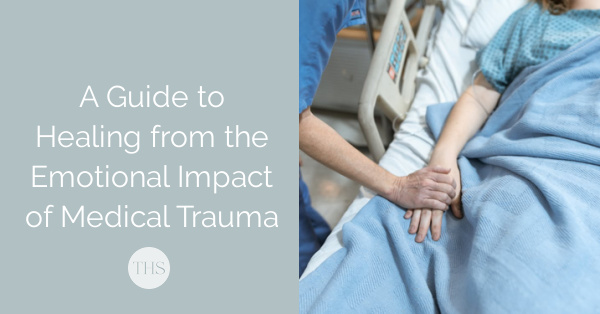The Power of Expression: How Sharing Your Story Helps

Being rushed to the ER because you can’t breathe. Needing an emergency C-section. Waking up in the ICU, your body connected to machines and your brain too fuzzy to understand what’s happening to you.
Thankfully, most people can’t phantom how frightening undergoing a life-threatening event or invasive medical procedure can be. Medical trauma leaves behind deep emotional wounds that need care and time to heal. The emotional impact of the medical experiences becomes longer-lasting, whether it is a sudden diagnosis, a complex surgery, or a prolonged hospitalization.
But with the right strategies and support, people can manage through healing and find flexibility. Healing may take time and feel like it’s forever. However, effective treatment options like trauma therapy can help people start to mend their emotional and physical health.
Medical trauma often triggers a range of emotional responses, like anxiety, fear, anger, grief, and also post-traumatic stress disorder. These emotions arrive from the feeling of being powerless, loss of control, and uncertainty about the future. It is vital to realize that your feelings are normal reactions to the abnormal circumstances, and healing is often a gradual process.
Trauma affects your emotional and physical health. Both your body and mind undergo an extreme amount of stress while engaging in the fight, flight or freeze responses of the nervous system.

Healing from medical trauma often appears as a daunting and overwhelming task. But following the techniques and strategies below can help you manage your trauma symptoms while achieving better well-being.
Triggers are situations, events, or individuals that remind you of the traumatic experience. They trigger a huge emotional response. Identifying your specific triggers is the initial step in building coping mechanisms.
You can work with a therapist or undergo trauma counseling to acknowledge these triggers while building a management plan. You can (temporarily) avoid such triggers or prepare yourself to cope with them whenever such events happen.
Medical events like having a heart attack, being intubated or being poorly treated by doctors canoften leave you grappling with numerous traumatic experiences, from post-traumatic stress disorder to emotional trauma. But there are a couple of ways to manage and recover from the medical trauma symptoms and start feeling better. Finding the right professional help from trauma therapy is the ideal way of starting the healing process.
You can find qualified therapists in numerous ways who can help them go through trauma recovery therapy. Reputed therapists and counselors should have proper licenses, experience, and specialization to treat trauma.
A reputed therapist will create a safer environment to help you feel comfortable by sharing your feelings, experiences, and reactions. They have the right knowledge and skills to address the distinctive requirements of people to recover from psychological trauma. In addition to talk therapy, EMDR – a form of therapy that uses specific eye movement to desensitize the emotional impact of the medical event – can be helpful to process trauma.

Medical trauma notably affects your emotional and physical well-being. Building coping mechanisms is the ideal way to manage the traumatic symptoms and initiate the healing process.
Coping mechanisms are the strategies and techniques the individuals mainly use for reducing stress and managing their triggers. Depending on your situation and preferences, you can seek support from family and friends, listen to calming music to relax, distract yourself with positive activties, clear your head with a walk or journal.
Setting goals is the ideal way to manage medical trauma symptoms and promote the healing process. Goals are often short or long-term and should be realistic and achievable. Goals include building an effective support system, managing your triggers, and engaging in physical activities. Working with therapists to set goals can help you stay on track and keep motivated to get ahead in life.
Relaxation techniques can help manage medical traumas that involve hypervigilance, rapid heart rate and insomnia. These tactics include progressive muscle relaxation, deep breathing exercises, or guided imagery. Any activity that relaxes your muscles, slows down your breathing and heart rate, and calms your mind works, even taking a warm bath or doing gentle yoga. Engaging in relaxation techniques help reduce your anxieties and promotes a better sense of calmness.
Physical symptoms such as fatigue, headaches, or sleep disturbances are common healing processes. Management of your physical symptoms involves identifying whenever the symptoms are happening and developing strategies to manage them effectively, like rebuilding healthy (sleep) routines.
You can engage in physical activities and relaxation techniques or deal with a healthcare provider to manage your physical symptoms.

Everyone shows trauma in their way; however, the initial step to recovery is identifying and acknowledging the struggle. The other step is accepting and understanding the additional help needed, like trauma therapy.
Allow yourself to ask for the right help from your friends, family, support programs, and healthcare professionals. It will help maximize your chances of overcoming any residual medical trauma symptoms and lead a healthier life.
Read more about why it’s important to treat unhealed trauma, plus remember that sometimes some good things can come out of a crisis.